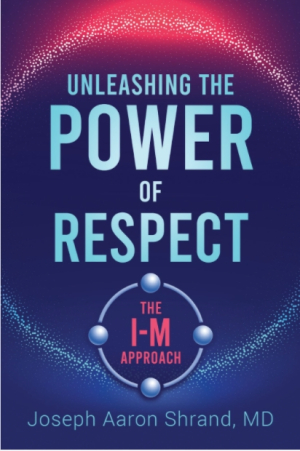Unleashing the Power of Respect
The I-M Approach
Unleashing the Power of Respect is an engaging self-help book that examines the value of respect in one’s life and interactions.
Psychiatrist Joseph Aaron Shrand’s timely, enlightening self-help book Unleashing the Power of Respect discusses how keen emotional reactions lead to better interpersonal interactions.
Introducing specific terms and frameworks for self-improvement like the I-M approach (which represents a person’s maximum potential) and the four domains that influence a person’s potential (home, social, biological, and Ic (“I see”)), this is a book about influencing others by being one’s best self. Its arguments build on illustrative anecdotes from Shrand’s interactions with his patients, including a sexual assault survivor and a mother with untreated attention deficit disorder. These experiences are mined for deep examples of the domains of influence at work, and are used to show how one’s potential can be improved upon with time and care. Indeed, the stories are made to apply to more ordinary situations than their circumstances represent: Shrand discusses calming a patient suffering from psychosis by treating him with respect and dignity; the book also devotes a chapter to explaining the value of not judging others, using Shrand’s work as an example.
Conditions including Autistic Spectrum Disorder, Bipolar Disorder, and Schizophrenia are represented in the course of this work, all discussed with examples of patients from multiple backgrounds. This broad range of somber real-world challenges is elucidated in a helpful manner. And because it uses case studies to highlight its perspective, the book is short on technical language and psychology-specific terms. When examples of disorders and unconscious biases arise, they are instead explained in a straightforward way: the book is able to usefully differentiate between overt and unconscious biases via its discussion of racism, for example. Recreated conversations between Shrand and his patients make the book even more accessible to general audiences.
While patient accounts are its backbone, the book also deviates from their serious work to include lighthearted stories featuring fictional characters, who are shown to feel more or less valuable based on their interactions with others. These tales represent a more depersonalized way of illustrating Shrand’s theories about the mind. Humor is an additional tool—one that’s used to avoid causing offense, to diffuse tense situations, and to help others overcome their anxiety about self-improvement. Most centered, and useful for the audience itself, are the book’s exercises for connecting with others; they imagine specific, common situations, like interacting with stressed coworkers, or taking personal responsibility for negatively impacting another person’s sense of self. The steps and actions that they recommend are logical and direct.
Illustrating its intriguing concepts via humane case studies drawn from a psychiatric practice, Unleashing the Power of Respect is an engaging self-help book that examines the value of respect in one’s life and interactions.
Reviewed by
Edith Wairimu
Disclosure: This article is not an endorsement, but a review. The publisher of this book provided free copies of the book and paid a small fee to have their book reviewed by a professional reviewer. Foreword Reviews and Clarion Reviews make no guarantee that the publisher will receive a positive review. Foreword Magazine, Inc. is disclosing this in accordance with the Federal Trade Commission’s 16 CFR, Part 255.

